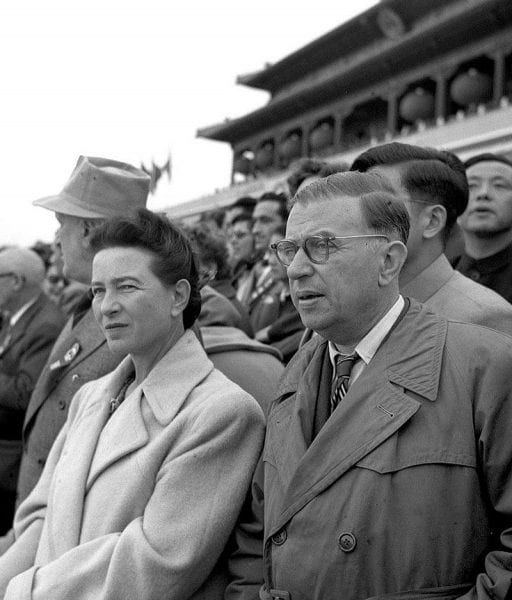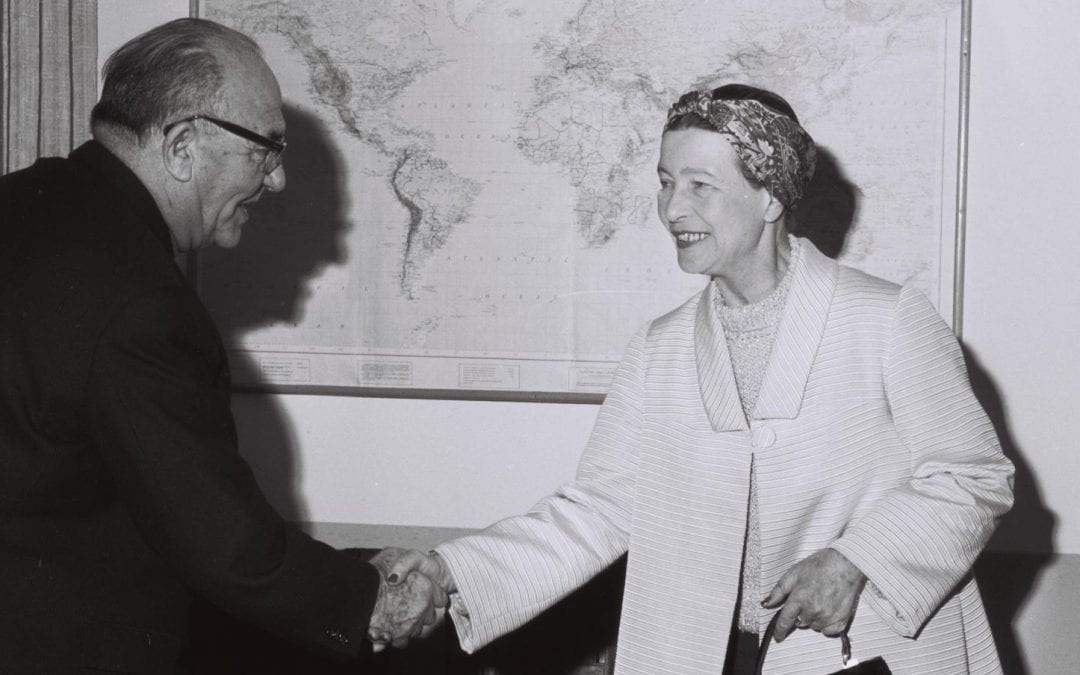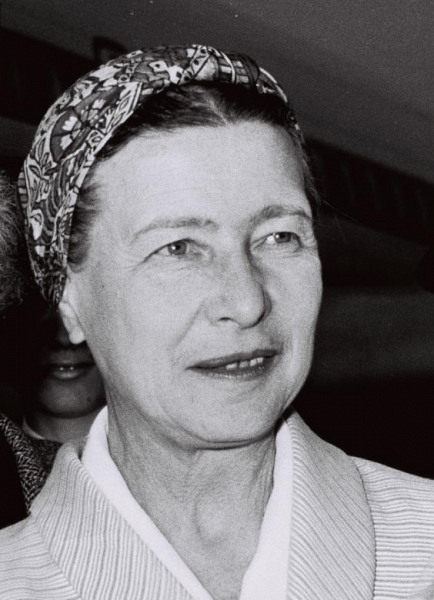By Kendrick Lee ~
In my short battle with existentialist philosophy in high school literature class, I became familiar with the works of some of the most famous: Camus, Sartre, Kierkegaard, and Heidegger. It was a brief stint, nothing more, but it wasn’t until later that I discovered that I had not touched the works of one of the most important existentialist philosophers, French novelists, and feminists: Simone de Beauvoir.
In her life, Simone de Beauvoir was known primarily for her literature and, in the less academic realm, her partnership with Jean-Paul Sartre. She would not become known as a philosopher, a feminist existentialist at that, until some time after her death. Beauvoir rejected her Catholic upbringing in a time when dowries were commonplace in order to pursue an education, an act of open defiance against not only the archetypes of marriage subjugating women but also against the idea of restricting freedom. Rather than marry, Beauvoir attended La Sorbonne, there meeting a young Jean-Paul Sartre, with whom she would develop her theories of freedom and existence that permeated her work; ideas that would later become the foundation of existentialism. Though Beauvoir’s work was about women’s lives being more than just romantic subplots in men’s lives, her own life was often viewed as one due to the nature of her relationship with Sartre. Together, they were part of a larger philosophical movement, and it is Beauvoir’s exclusion from the realm of philosophy that this blog post will discuss.
The opening of Volume 2, Part 1 of The Second Sex reads as follows: “One is not born, but rather becomes, woman” (Beauvoir, 330). This short, famous phrase encompasses a large portion of Beauvoir’s theories in both philosophy and feminism. First is the idea that the nature of the existence of a woman is not destined in any sort of way. “Woman,” as Beauvoir writes here, is not the typical male/female distinction that is not given a second thought in daily life, but rather a social outline fabricated by men on the basis that women are somehow lacking or inferior. How one tells a male face apart from a female face is different from what separates man and woman. This idea, which will be explored later in this paper, is an important distinction between sex and gender that will become the focus of Beauvoir’s writing.
The second idea is that of becoming; the idea that one creates the meaning for their own existence through free action and free will. However, when those freedoms are limited, the things that one can become are also limited. In Beauvoir’s own words, “the destiny that society traditionally offers women is marriage” (502). This was not just true to Beauvoir’s era. Marriage, or the lack thereof, is the basis of a lot of frustration in single women and ire from their families. Beauvoir’s theory of marriage is that it is the exchange of services; the women serving the men and the household, therein fulfilling their societal duties, and society laying responsibility on men to Beauvoir’s refusal to accept gender roles as a matter of biological sex differences is quite philosophical; rejecting the ideas of absolute states in favor of determining one’s own existence.

Simone de Beauvoir and Jean-Paul Sartre attended the ceremony of 6th Anniversary of Founding of Communist China in Beijing on 1 October 1955 in Tiananmen square.
Before Beauvoir’s seminal work of feminist literature, she published an essay entitled The Ethics of Ambiguity, a foray into philosophy embracing existentialism, defined as the philosophy of ambiguity, in the post-war period. Here, she denounces religion, as systems of belief “allow us to evade responsibility for creating the conditions of our existence and to flee the anxieties of ambiguity” (Bergoffen and Burke), exchanging it for the idea that consciousness operates in two key ways. The first is that consciousness seeks meaning for itself. The second is that consciousness brings meaning into the world through free will. In other words, Beauvoir argues that the actions of a free consciousness dictate the meaning of the world that it lives in. The first action, Beauvoir might say, is borne out of fulfillment or happiness. The second is borne out of expectations projected on the world; whether these are optimistic or pessimistic in nature is dependent on the dominant state of mind. She writes, “The nihilist is right in thinking that the world possesses no justification and that he himself is nothing. But he forgets that it is up to him to justify the world and to man himself exist validly” (Beauvoir). A nihilist denies himself existence while simultaneously existing, and it is the responsibility of oneself to validate their existence. A nihilist likes action for the sake of itself, while an existentialist likes action for the sake of freedom.
Freedom of consciousness as Beauvoir defines it is as burdensome as it is liberating. She might say that one is thrust into existence with the freedom to create a meaning for it, and while we may try our best, naturally the desire to find meaning and create it in the world will never be fully satisfied by any means one could take. She discards the notion of absolutes, in favor of living without predetermined limitations. On the other hand, she does not completely reject all meaning in life. She writes, “The nihilist is right in thinking that the world possesses no justification and that he himself is nothing. But he forgets that it is up to him to justify the world and to man himself exist validly” (The Ethics of Ambiguity, II). Ultimately, one is left for themselves to decide what their existence entails, and this is what Beauvoir means by ambiguity. Difficulties and problems in life are not best dealt with in absolutes, especially complex problems involving others’ interests. That is to say, the titular ethics of ambiguity are not resigned to just self-interest. There are no absolute goods or evils in Beauvoir’s philosophy, save for one: the denial of freedom. In a continuation on the discussion of nihilism, she writes “the nihilist is a systematic rejection of the world and man, and if this rejection ends up in a positive desire, destruction, it then establishes a tyranny which freedom must stand up against” (II) The denial of freedom, particularly those of others’, is the only evil, and Beauvoir goes on to say that one’s freedom cannot be affirmed through the oppression of others’ (Gillespie).
In the year following, Beauvoir would go on to publish her, indisputably, most prominent work: The Second Sex. A massive tome with sections pertaining to biology, romanticization of femininity, and primitive history, it garnered Beauvoir both acclaim and notoriety in the academic world and beyond. In Western European countries like France, Germany, and Switzerland, the reception was generally positive with the criticism mostly coming from Christianity due to the challenge on its marital structure. In Eastern Europe, however, the book tended to be censored in countries with dictatorships . An English translation of The Second Sex was published, but its content was pared down heavily, losing much of its original philosophical bulk (Chaperon). As Beauvoir gained fame with a later novel, The Mandarins, for which she won the Prix Goncourt, more attention was paid to her feminist themes; her ideas of becoming and her examination of femininity.
There is a key idea in the introduction of The Second Sex, wherein Beauvoir quotes French philosopher Julian Benda’s writings in Le Rapport d’Uriel. The quote follows,
A man’s body has meaning by itself, disregarding the body of the woman, whereas the woman’s body seems devoid of meaning without reference to the male. Man thinks himself without woman. Woman does not think herself without man (26).
This is one of the central philosophies of The Second Sex: the role imposed on women by men, known as the Other (Beauvoir, 26). The Other is always defined in relation to men. One notable example comes from Christianity, whose creation myth sees the woman, Eve, being created from the ribcage of the man, Adam. Man is still the progenitor, the first, and the woman is meant to follow him. What Beauvoir saw in the world around her was exactly that: men are defined by their actions and women are defined by their relationships with/towards others, particularly men. To think of it another way, the end goal of any person might be to be successful and happy. For men, this is achieved through hard work, attaining power and control over their own lives. A woman who has the same things is not usually within society’s definitions of what a woman should be. Beauvoir calls women “the second sex” because women were always presented as lacking certain qualities that men had, and this can be seen everywhere. From women being treated as medical anomalies in comparison to men, to women being expected to play the role of a housewife, examples abound of the distinction between men and the Other.
Furthermore, Beauvoir explores the origins of the distinction between men and the Other in biology, history, and modern society. She recognizes that the biological nature of the distinction between male and female exists in order to further the human race; to prolong the existence of the species; but that this goal does not mean that the roles that the male and female play must be differentiated.
There are parallels between Beauvoir’s take on gender and her overall philosophy of life’s ambiguity. Similar to the existentialist concept that one’s life is not predetermined by any force but presently by their free will, Beauvoir argued that gender is not inherent either. There are no major biological distinctions between men and women besides sex, but men have taken that distinction and spun it into a societal imbalance. To that end, men create a system of ideals for women, integrated into society, forcing a purpose on the woman’s world. If a well-known game development studio announced an open-world exploration game and upon release it was discovered that the exploration was restricted to only a few areas of the world, players would likely be frustrated with the studio. This is analogous to Beauvoir’s clash with the societal definition of womanhood, which calls upon its women not to be great intellectuals and revolutionaries, but to be good mothers and wives.
Though highly respected in the academic world for her feminist writings and teachings (Gillespie), Beauvoir was often slighted by her peers, who did not treat her work with the same seriousness as they might have considered that of her male peers. Her theory that freedom should never infringe on another’s freedom was lost to the men of academia because they had taken their freedom for granted. Men were not concerned with a woman’s philosophy of the world because they did not face the same pressure in society. They had no idea of realizing exactly how much Beauvoir had put on the line as a woman to be able to join the intellectual world. The Second Sex, at the time of its release, was not considered to be a philosophical text because it dealt in feminism and sex, hardly issues for male philosophers then (Kirkpatrick).
Backlash even came from other women; according to French intellectual Jeannette Colombel (qtd. in Mano), “the enemy isn’t men but capitalism. Declaring a conflict between men and women distracts one from the real problem: the misery of the working class and the threat of war” (Mano, Introduction). There is some weight to the fact that another woman criticized one of the most important feminist works of the 20th century, but the argument is not without some merit. In 1944, women in France finally won suffrage, a big win for women in one of the last Western countries that had still not granted its women voting rights. The Second Sex was published in 1949, five years after the right to vote had been established for women. Perhaps some felt that women had gotten enough in the world and were more or less on equal footing.
Even in her writing, people wanted to see less feminist themes and more romanticization of her life and womanly perspective. Her close relationship with Sartre was also somewhat of a roadblock to her recognition. Though she fell in with a young Sartre and they developed the central ideas of existentialism together, she was often treated as his understudy. Sartre was often asked questions about his works and his theories; Beauvoir was often asked questions concerning her personal life. This is not to say that in analyzing Beauvoir’s work, Sartre should be left out of the picture. The two had an undisputable influence on each other’s works, as they were part of a much broader movement. Beauvoir was undoubtedly a premier thinker of her time, regardless of the reception she received in the moment or her hesitation to claim the title of philosopher.
In analyzing Beauvoir’s feminist theories and works, there is a sense of irony in the dichotomy between her ideas and the way her life is often analyzed. Though an attempt was made in this blog post to shift focus away from the details of Beauvoir’s open relationships, bisexuality, and sexual misconduct allegations, there is still a juxtaposition between Beauvoir’s ideas and her actions in her various relationships. Efforts might have been made to tarnish her name, bringing to light her sexuality and promiscuity. That said, I believe that there are further similarities in the way Beauvoir thought and the way she treated her relationships. She did not see herself confined to the idea of marriage, or single devotion to one person for the rest of her life. The complexity of her relationships might be compared to her theories about the complexity of existence. We are left to decide for ourselves who and what to love, and the way that takes form may be unconventional or unorthodox to society, but we should never take stock in the definitions that are placed on us by others.
About the author:
Hello, my name is Kendrick. I’m a second-year pre-med at the University of Chicago, majoring in biology. I currently reside in Hyde Park, Chicago, but my hometown is Eugene, Oregon. Some of my hobbies include playing tennis (not as viable in the Chicago winter), listening to alternative music (on a big Gorillaz binge), and backpacking (also not as viable in Chicago). I’m also a member of the Pi Kappa Alpha fraternity at UChicago. I had never heard of Simone de Beauvoir before I did my research for this project and was recommended I look into her by my father, who was a sociology major. After doing some initial digging, I felt that there was a very interesting dilemma in that her relationship with Sartre defined so much of her life while she argued against exactly that. Ultimately, that was what motivated me to write on her theories, which I feel will never fade into ambiguity.
References:
Featured Image: Prime minister Levy Eshkol welcoming french writer Simone de Beauvoir in his office at HaKirya in Tel Aviv. Wikimedia Commons.
Beauvoir, Simone de, and Constance Capisto-Borde. The Second Sex. Vintage Books, 2011.
Beauvoir, Simone de, and Bernard Frechtman. The Ethics of Ambiguity. Philosophical Library : distributed by Open Road Integrated Media, 2015.
Bergoffen, Debra, and Megan Burke. Simone de Beauvoir. Aug. 2004. plato.stanford.edu, https://plato.stanford.edu/archives/sum2020/entries/beauvoir/.
Chaperon, Sylvie. “Reception of The Second Sex in Europe.” Encyclopédie d’histoire Numérique de l’Europe, https://ehne.fr/en/encyclopedia/themes/gender-and-europe/feminisms-and-feminist-movements/reception-second-sex-in-europe. Accessed 6 Dec. 2020.
Gillespie, Iseult. “The Meaning of Life According to Simone de Beauvoir – Iseult Gillespie”. YouTube. https://www.youtube.com/watch?v=Ws2Y2cWme8c. Accessed 6 Dec. 2020.
Kirkpatrick, Kate. “Was Simone de Beauvoir as Feminist as We Thought?” The Guardian, 20 Aug. 2019.
Mano, Maíra Kubík, and Maíra Kubík Mano. “The Woman Destroyed: From Simone de Beauvoir to “gender Ideology.” Cadernos Pagu, no. 56, 2019. SciELO, doi:10.1590/18094449201900560024.



You really explore the ideas of existence, and what it means to be a woman interacting with both women and men. It’s interesting to think about the complexities of the lives of others that we’ll never know about. Loving people can be so hard, and it’s also hard to know what they’re going through too. Interesting paper 🙂